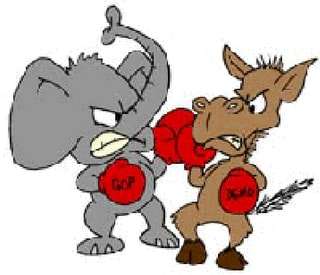The Volokh Conspiracy
Mostly law professors | Sometimes contrarian | Often libertarian | Always independent
The disturbing growth of partisan bias

This recent article by Ezra Klein of Vox summarizes a variety of survey and experimental data showing growing hatred of supporters of the opposing party among both Republicans and Democrats. The studies even show that partisan prejudice is far more common than racial prejudice by whites against blacks, or the reverse. While racial and ethnic prejudice is stigmatized by society, hatred of political opponents is not, and is often even encouraged by political activists and partisan media.
The rise of "partyism," as Harvard Law Professor Cass Sunstein calls it, is a disturbing trend for several reasons. Among other things, it reinforces our already strong tendency to reflexively dismiss ideas associated with political adversaries. If you think most supporters of the opposing party are evil or stupid, it's easy to preemptively reject their proposals without giving them any serious consideration.
At this point, partisans will be tempted to say that their own party's supporters are already well-informed and have already given serious consideration to any genuinely worthy ideas out there. It's only the other side's partisans who are ignorant and biased. But the sad truth is that political ignorance and irrational thinking are widespread among both parties' supporters. Neither Team Red nor Team Blue is such a great font of wisdom that they can afford to close their minds to contrary perspectives.
Moreover, partisan bias doesn't just lead people to preemptively reject ideas emanating from the opposing party. It also causes partisans to justify or overlook bad behavior by their own side. Both Republican and Democratic partisans have turned a blind eye to or even supported much from their own leaders that they would have opposed tooth and nail if the other side had done the same thing. Under Obama, the left-wing antiwar movement has largely evaporated, even as he continues and in some cases even expands Bush's abuses of executive war powers.
Most Republicans tolerated the vast expansion of government spending and regulation under George W. Bush. Today, a good many Republicans are happy to overlook or even endorse Donald Trump's contempt for constitutional restraints on government power, even though they excoriated Barack Obama for real and imagined sins of the same kind. Indeed, surveys show that many Republicans are happy to endorse left-wing policy positions such as nationalization of health care and racial preferences, so long as they are associated with Trump.
The problem here is not so much that partisans accept policies they might previously have rejected. Perhaps Bush's war policies or Obama's approach to executive power were the right position all along. In principle, it is possible to hate the opposition, while simultaneously being tough on your own party's leaders, as well. But, in practice, the more you hate the other side, the more you will tend to excuse your own leaders' bad behavior, so long as they seem to be fighting the good fight against the partisan enemy.
Partisan prejudice can sometimes be beneficial. For example, it occasionally allows a president of one party to adopt valuable reforms that the other party would be unable to push through because it would encounter too much resistance. In general, however, partisan double-standards undermine rather than improve the already dubious quality of public discourse on political issues.
Sadly, it is unlikely that partisan bias will disappear or even noticeably diminish anytime soon. Part of the reason it will not is the increasing polarization between the parties in recent years. It's more tempting to hate the opposition if their views differ substantially from your own, than if the gap is relatively small.
An even deeper root of the problem is that unreflective bias actually represents rational behavior for most voters. Careful, unbiased consideration of opposing view requires time and effort, and will often cause emotional discomfort. And there is very little incentive to do so just to become a "better" voter, given the reality that your better-informed vote has only an infinitesmally small chance of changing the outcome of any election.
It is much more emotionally satisfying to seek out only information that conforms to your preexisting views, and ignore or dismiss that which cuts against them. As a result, many of those most interested in politics tend to analyze information not as truth-seekers, but as "political fans" intent on cheering on their favorite political team and excoriating the opposition. Such people tend to be much more illogical and biased when analyzing political information, then when considering very similar information about nonpolitical issues. When the subject turns to politics, we often check our brains at the door. As the great economist Joseph Schumpeter put it, "the typical citizen drops down to a lower level of mental performance as soon as he enters the political field. He argues and analyzes in a way which he would readily recognize as infantile within the sphere of his real interests."
Elsewhere, I have argued that we can reduce the risks of political ignorance and bias by making more decisions by "voting with our feet" and fewer at the ballot box. Still, I have to admit that there is no easy solution, certainly not one that is likely to be adopted quickly. But the beginning of wisdom is at least to recognize that we do in fact have a serious problem, and that it is not limited to the close-minded drones who support the rival party you love to hate.


Show Comments (0)